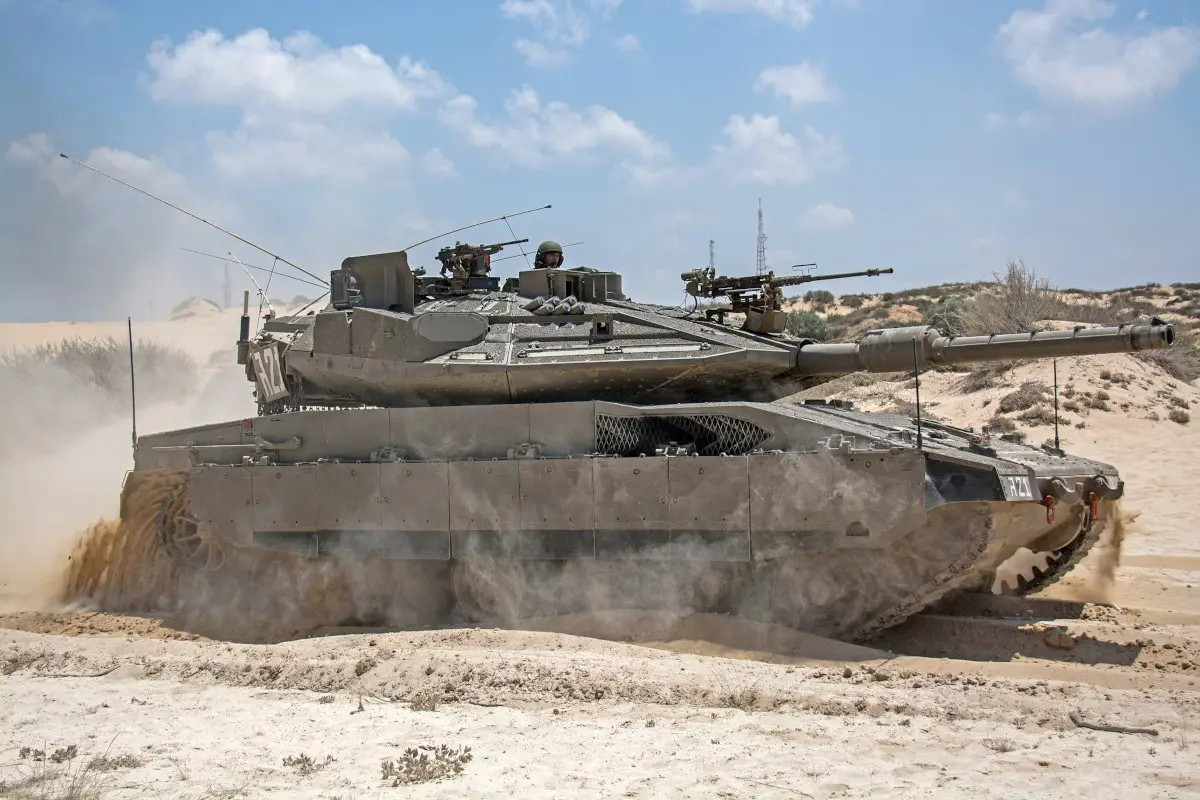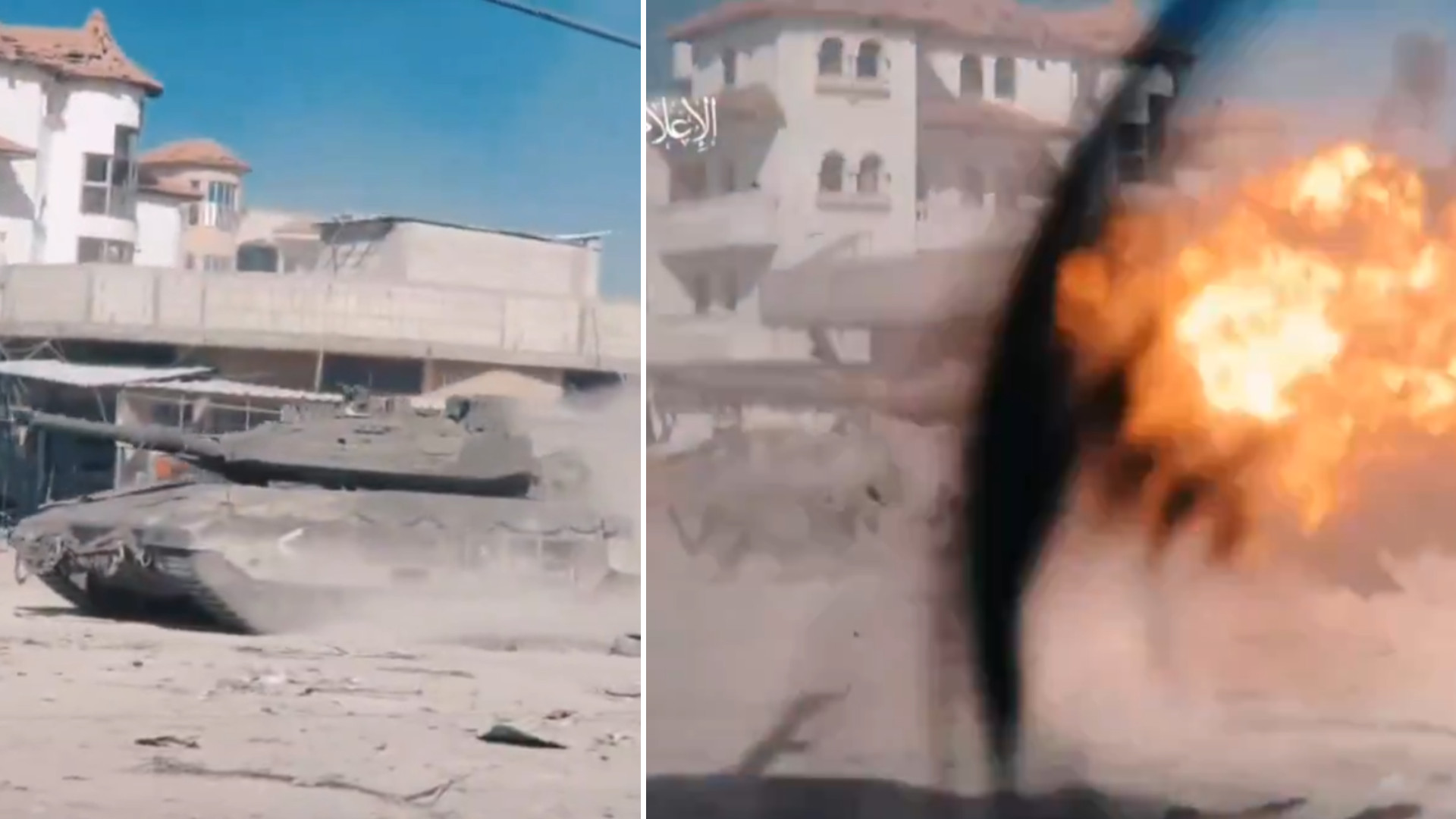A new video released by the Palestinian militant group Hamas, perhaps ironically, offers one of the best looks to date at the Israeli-made Trophy active protection system in action. The system in this case is installed on one of Israel’s Merkava tanks involved in the current conflict in Gaza. The clip also underscores the exact kind of use cases where this kind of additional protection is especially valuable.
The video in question is the first in a montage of clips, seen in the social media post below. All of the footage is said to have been shot by Hamas militants during recent fighting in and around Khan Younis (also often spelled Khan Yunis) in the southern end of the Gaza Strip.
The initial clips shows a Merkava tank heading down a street at a relatively high speed when it is attacked. It is unclear what weapon the assailants employed, but Hamas has been actively employing various types of rocket-propelled grenades against Israeli vehicles. Regardless, the tank’s Trophy system is clearly triggered. Though the footage ends without a clear look at the Merkava in the aftermath of the attack, it can seen still moving along before it cuts off.
The second clip in the montage may show the Trophy system on a stationary Merkava activating in response to an attack, as well. However, what is seen happening in that footage is much less clear-cut overall and the Merkava also looks as if it may already be immobilized or otherwise damaged.


Trophy’s exact configuration depends on the vehicle on which it is installed, but they all consist of an array of small radars and multiple launchers pre-loaded with multiple ‘hard-kill’ projectiles. The radars detect incoming threats and cue the launchers to fire their payloads. Though an explosive charge is used to blast the projectiles outward, they are themselves kinetic in nature, meaning they are designed to destroy, or at least disrupt, their targets by physically smashing into them.
The promotional video below from Trophy’s manufacturer Rafael offers a good general overview of how the system functions.

Trophy is primarily intended to defend against anti-tank guided missiles and other kinds of infantry anti-armor weapons, such as shoulder-fired rockets and rocket-propelled grenades. Standard installations are designed to provide “360° protection in azimuth as well as extensive elevation coverage,” not total 360-degree coverage in all directions, according to Rafael.
The clip that Hamas has released underscores the value of active protection systems like Trophy, especially for tanks and other vehicles operating in dense urban environments. Urban landscapes offer hostile forces a ready supply of vantage points and hard cover from which they can mount ambushes on passing vehicles at very close range.
The Merkava seen in the video is also moving at speed and with its crew buttoned up inside, all of which can limit situational awareness. The tank also appears to be by itself with no other vehicles or accompanying dismounted infantry to help provide overwatch. Why this is the case is unclear, but it is worth noting that Trophy does present some risks to infantry, especially if they are working very close to the vehicle it is mounted on, as would be the case in an urban environment. Rafael does say that Trophy is designed to provide “pre-defined safety zone for friendly troops” and present “minimal risk to dismounts, crews, or civilians.” Whatever the circumstances, the video does show Trophy helping to fill in some of those gaps.
Israeli defense contractors have been pioneers in active vehicle defenses and continue to be leaders in this space. The Israel Defense Forces first began fielding Merkava tanks with Trophy, specifically, in 2009. This was a decision that was driven in no small part by lessons learned from Israel’s conflict with the Lebanese militant group Hezbollah in that country in 2006.

At least 40 Merkavas were damaged in the fighting back in 2006 by anti-tank guided missiles, as well as infantry anti-armor weapons and mines, according to a white paper published by the U.S. Army’s Combined Arms Center. Between five and six Merkavas were categorized as “destroyed” as a result of various kinds of attacks, according to separate analysis from the Center for Strategic and International Studies think tank in Washington, D.C. Some of those tanks may have been subsequently returned to service after extensive repairs.

Israeli officials subsequently credited Trophy with being a big part of why no Merkavas reportedly suffered significant damage during the conflict in Gaza in 2014.
Trophy is, of course, not perfect. There is still the potential for incoming threats to get through, especially if a large volume of weapons are fired at a single target at once. It is not designed to protect against all kinds of threats, either, including enemy personnel sneaking up to plant explosive charges directly on vehicles. The system also simply may not always be active, either, especially if infantry are present nearby.
As already noted, it also does not provide total 360-degree coverage and Israeli Merkavas and other armored vehicles have emerged with add-on metal armor screens on top in the course of the current conflict in Gaza. Screens like this, which first appeared on Russian tanks in the build-up to that country’s all-out invasion of Ukraine in 2022, are primarily designed to defend against attacks involving lower-tier drones. Ukrainian forces now also make extensive use of this kind of improvised armor and it has begun to appear elsewhere around the world, including with Mexican drug cartels.
As already noted, Trophy does not provide complete 360-degree coverage. Hamas notably used weaponized drones to conduct top-down attacks on Israeli tanks and other targets as part of its brazen attacks on October 7.
Exactly how many Merkavas, as well as other Israeli armored and unarmored vehicles, may have been destroyed or damaged in the fighting in and around Gaza since October 7 is unclear. At the time of writing, there is visual evidence that at least 24 Merkavas have been destroyed or damaged in the conflict to date.
Regardless, the video clip of the Merkava under attack shows clearly how Trophy provides an important additional layer of defense. At the same time, as was the case with the fighting in Lebanon in 2006, new lessons learned about protecting tanks and other vehicles from existing and emerging threats will undoubtedly come out of the current conflict in Gaza.
Contact the author: joe@thedrive.com

